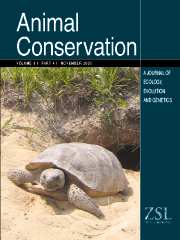Crossref Citations
This article has been cited by the following publications. This list is generated based on data provided by
Crossref.
Linnell, John D. C.
Swenson, Jon E.
and
Anderson, Reidar
2001.
Predators and people: conservation of large carnivores is possible at high human densities if management policy is favourable.
Animal Conservation,
Vol. 4,
Issue. 4,
p.
345.
Robitaille, Jean-François
and
Laurence, Sophie
2002.
Otter, Lutra lutra, occurrence in Europe and in France in relation to landscape characteristics.
Animal Conservation,
Vol. 5,
Issue. 4,
p.
337.
Harcourt, A.H
and
Parks, S.A
2003.
Threatened primates experience high human densities: adding an index of threat to the IUCN Red List criteria.
Biological Conservation,
Vol. 109,
Issue. 1,
p.
137.
TREVES, ADRIAN
and
KARANTH, K. ULLAS
2003.
Human‐Carnivore Conflict and Perspectives on Carnivore Management Worldwide.
Conservation Biology,
Vol. 17,
Issue. 6,
p.
1491.
O'Brien, Timothy G.
Kinnaird, Margaret F.
and
Wibisono, Hariyo T.
2003.
Crouching tigers, hidden prey: Sumatran tiger and prey populations in a tropical forest landscape.
Animal Conservation,
Vol. 6,
Issue. 2,
p.
131.
Patterson, Bruce D.
Neiburger, Ellis J.
and
Kasiki, Samuel M.
2003.
TOOTH BREAKAGE AND DENTAL DISEASE AS CAUSES OF CARNIVORE–HUMAN CONFLICTS.
Journal of Mammalogy,
Vol. 84,
Issue. 1,
p.
190.
Balmford, Andrew
Gaston, Kevin J.
Blyth, Simon
James, Alex
and
Kapos, Val
2003.
Global variation in terrestrial conservation costs, conservation benefits, and unmet conservation needs.
Proceedings of the National Academy of Sciences,
Vol. 100,
Issue. 3,
p.
1046.
Boydston, Erin E.
Kapheim, Karen M.
Watts, Heather E.
Szykman, Micaela
and
Holekamp, Kay E.
2003.
Altered behaviour in spotted hyenas associated with increased human activity.
Animal Conservation,
Vol. 6,
Issue. 3,
p.
207.
MUSIANI, MARCO
MAMO, CHARLES
BOITANI, LUIGI
CALLAGHAN, CAROLYN
GATES, C. CORMACK
MATTEI, LIVIA
VISALBERGHI, ELISABETTA
BRECK, STEWART
and
VOLPI, GIULIA
2003.
Wolf Depredation Trends and the Use of Fladry Barriers to Protect Livestock in Western North America.
Conservation Biology,
Vol. 17,
Issue. 6,
p.
1538.
Patterson, Bruce D
Kasiki, Samuel M
Selempo, Edwin
and
Kays, Roland W
2004.
Livestock predation by lions (Panthera leo) and other carnivores on ranches neighboring Tsavo National ParkS, Kenya.
Biological Conservation,
Vol. 119,
Issue. 4,
p.
507.
Nielsen, Scott E.
Herrero, Stephen
Boyce, Mark S.
Mace, Richard D.
Benn, Bryon
Gibeau, Micheal L.
and
Jevons, Scott
2004.
Modelling the spatial distribution of human-caused grizzly bear mortalities in the Central Rockies ecosystem of Canada.
Biological Conservation,
Vol. 120,
Issue. 1,
p.
101.
Löe, Jonny
and
Röskaft, Eivin
2004.
Large Carnivores and Human Safety: A Review.
AMBIO: A Journal of the Human Environment,
Vol. 33,
Issue. 6,
p.
283.
Jȩdrzejewski, Włodzimierz
Niedziałkowska, Magdalena
Nowak, Sabina
and
Jȩdrzejewska, Bogumiła
2004.
Habitat variables associated with wolf (Canis lupus) distribution and abundance in northern Poland.
Diversity and Distributions,
Vol. 10,
Issue. 3,
p.
225.
MARKER, LAURIE
and
DICKMAN, AMY
2004.
Human Aspects of Cheetah Conservation: Lessons Learned from the Namibian Farmlands.
Human Dimensions of Wildlife,
Vol. 9,
Issue. 4,
p.
297.
Pyare, Sanjay
Cain, Steve
Moody, Dave
Schwartz, Chuck
and
Berger, Joel
2004.
Carnivore re‐colonisation: reality, possibility and a non‐equilibrium century for grizzly bears in the southern Yellowstone ecosystem.
Animal Conservation,
Vol. 7,
Issue. 1,
p.
71.
Mattson, David J.
and
Merrill, Troy
2004.
A model-based appraisal of habitat conditions for grizzly bears in the Cabinet–Yaak region of Montana and Idaho.
Ursus,
Vol. 15,
Issue. 1,
p.
76.
WILSON, CHARLES J.
2004.
Could we live with reintroduced large carnivores in the UK?.
Mammal Review,
Vol. 34,
Issue. 3,
p.
211.
Cardillo, Marcel
Purvis, Andy
Sechrest, Wes
Gittleman, John L
Bielby, Jon
Mace, Georgina M
and
Craig Moritz
2004.
Human Population Density and Extinction Risk in the World's Carnivores.
PLoS Biology,
Vol. 2,
Issue. 7,
p.
e197.
Ogutu, Joseph O.
Bhola, Nina
and
Reid, Robin
2005.
The effects of pastoralism and protection on the density and distribution of carnivores and their prey in the Mara ecosystem of Kenya.
Journal of Zoology,
Vol. 265,
Issue. 3,
p.
281.
Graham, Kate
Beckerman, Andrew P.
and
Thirgood, Simon
2005.
Human–predator–prey conflicts: ecological correlates, prey losses and patterns of management.
Biological Conservation,
Vol. 122,
Issue. 2,
p.
159.


